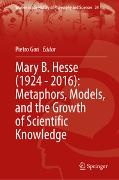Ulteriori informazioni
This volume explores the work of Mary B. Hesse (1924–2016), a pivotal figure in twentieth-century philosophy of science. At a time when the foundations of an integrated approach to the history and philosophy of science were being established, Hesse, as a female philosopher, offered a distinctive and influential contribution grounded in a post-empiricist understanding of the natural sciences. Central to her thought was a focus on the metaphorical and analogical value of scientific language, in contrast to views assessing its literal significance. Hesse also departed from traditional hypothetico-deductive accounts of scientific methodology and theory structure, advancing instead perspectives rooted in both historical and contemporary scientific practices.
To mark the centenary of her birth, this book brings together an international group of scholars to re-examine and engage with Hesse’s intellectual legacy. The chapters address the central themes of her work and situate them within her broader philosophical context. Each contribution adopts a cross-disciplinary perspective, highlighting the continued relevance of Hesse’s ideas to current debates in the philosophy of science.
This volume will be of particular interest to scholars in the history and philosophy of science, as well as those engaged in gender studies and the study of women in philosophy.
Sommario
Maurício Suarez, “Mary Hesse in Cambridge”.- Matteo Collodel, “Hesse and the Historical Turn in the Philosophy of Science”.- María de Paz, “Hesse’s Early Works as a Philosopher of Science”.- Pietro Gori, “Mary Hesse’s Hermeneutic Account of Natural Science”.- David Hommen, “Mary Hesse’s view of Scientific Explanation”.- Alisa Bukolich, “Contemporary Issues on Scientific Modelling. Crossing Hesse’s Path”.- Lisa Zorzato, “Fiction and Reality. Open Questions on Scientific Representation.
Info autore
Pietro Gori is an Assistant Professor in the Department of Philosophy and an integrated member of the Institute of Philosophy at NOVA University Lisbon, where he teaches Philosophy of Science and Philosophy of Knowledge, among other subjects. His main areas of academic focus include Modern and Contemporary Western Philosophy, the History and Philosophy of Science, Epistemology, and Philosophical Anthropology. Within this framework, Gori has devoted particular attention to figures associated with the anti-foundationalist turn in philosophy, with a specific focus on the works of Friedrich Nietzsche, William James, and Ernst Mach. Since 2021, his research has also centered on the work of British philosopher of science Mary B. Hesse and her post-empiricist approach. His extensive body of publications includes monographs, edited volumes, scholarly editions, book chapters, and articles in international journals.
Riassunto
This volume explores the work of Mary B. Hesse (1924–2016), a pivotal figure in twentieth-century philosophy of science. At a time when the foundations of an integrated approach to the history and philosophy of science were being established, Hesse, as a female philosopher, offered a distinctive and influential contribution grounded in a post-empiricist understanding of the natural sciences. Central to her thought was a focus on the metaphorical and analogical value of scientific language, in contrast to views assessing its literal significance. Hesse also departed from traditional hypothetico-deductive accounts of scientific methodology and theory structure, advancing instead perspectives rooted in both historical and contemporary scientific practices.
To mark the centenary of her birth, this book brings together an international group of scholars to re-examine and engage with Hesse’s intellectual legacy. The chapters address the central themes of her work and situate them within her broader philosophical context. Each contribution adopts a cross-disciplinary perspective, highlighting the continued relevance of Hesse’s ideas to current debates in the philosophy of science.
This volume will be of particular interest to scholars in the history and philosophy of science, as well as those engaged in gender studies and the study of women in philosophy.

